England at the Cricket World Cup: Death threats, dodgy tummies and a dip in the sea
- Published
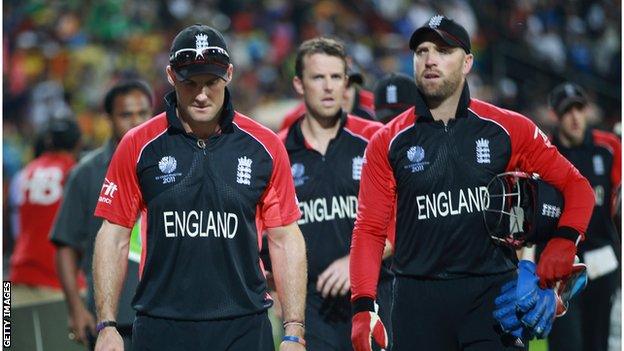
England have not beaten a Test-playing nation in a World Cup knockout match since 1992
ICC Men's Cricket World Cup 2019 |
|---|
Dates: 30 May - 14 July, 2019 |
Live coverage: Ball-by-ball commentary on Test Match Special, plus text commentary, clips and highlights on the BBC Sport website |
You have to know the past to understand the present.
That England enter the World Cup as favourites and number one ranked team on the planet is an incredible transformation not only from the abject failure of the 2015 tournament, but the five previous editions too.
Since they last reached the final in 1992, they have lost exactly half of their 38 World Cup matches and only seven of their 18 victories have come against Test-playing teams. Not one of those has been in a knockout match.
These are England's World Cup tales of woe, told by the men who were there. From food poisoning to the Fredalo, death threats to a lot of defeats.
1996 - 'I ran past the keeper and threw up'
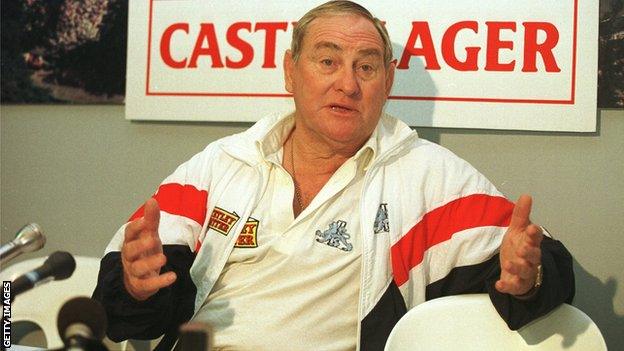
Ray Illingworth was England's coach, manager and chairman of selectors during the 1996 World Cup
If 1992 was the rebirth of the World Cup, with coloured clothing, white balls and floodlights, then the 1996 event in India, Pakistan and Sri Lanka was when one-day cricket grew up.
With Sri Lanka providing the rest with an epiphany thanks to the swashbuckling of Sanath Jayasuriya at the top of the order, England took longer to wake up than most.
"We were not anywhere near as forward-thinking," said Neil Smith, who had been called-up for his off-spin, but ended up opening the batting.
"The side was packed with quality cricketers, but there wasn't the clarity of thought."
As England limped through their group, Smith would provide an infamous World Cup moment.
"We took pills every day to stop us being ill. They were the size that you'd give to a donkey, the theory being they would stop us being ill. Prior to the interval in the game against UAE I started feeling unwell and it got slowly worse.
"I went out to open the batting and knew I wasn't feeling good. I couldn't get a drink brought out because the World Cup was during Ramadan. When we took drinks breaks, we actually left the field. The physio reminded me that I couldn't have a drink and I couldn't go off in the middle of an over, just to have a drink and take a pill.
"After that, I ran a three and that was the end of it. I ran through, past the keeper and threw up."
At the time, straight-talking Yorkshireman Ray Illingworth was England's coach, manager and chairman of selectors and said of Smith's plight: "He had a pizza last night. Now it's on the field out there."
Smith continued: "I came from a successful Warwickshire team where we talked things through. As a new player I thought I might get a bit of input from Ray, but I didn't get anything at all.
"We had two discussions - one about Fred Trueman and Brian Statham, and the other about holiday homes in Spain."
In the quarter-finals, England were hammered by Sri Lanka. So dominant were the eventual champions that pace bowler Phil DeFreitas started bowling off-spin while the omitted Smith watched on.
"It was difficult to sit and watch from a personal point of view and it highlighted that we didn't have enough to cope with how the game was shifting in momentum.
"The rest of the world were playing a different one-day game."
1999 - 'It was shambolic'
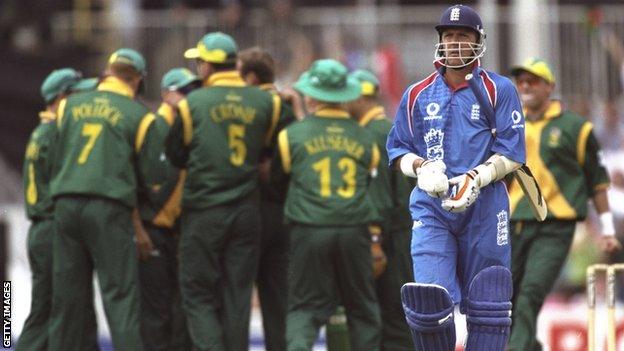
England failed to make it past the group stage the last time the World Cup was hosted in the country in 1999
In 1999, cricket was supposed to come home, but hosts England were knocked out even before the tournament's official song was released.
The problems, though, had started months earlier.
"There were issues with contracts," said then-England captain Alec Stewart. "Simon Pack, the ECB's international teams director, came to see me on the afternoon before the first day of the first Ashes Test in Brisbane the previous winter. That summed it up. We were trying to compete in an Ashes series and he wanted to talk about something that wasn't going to happen for five months.
"It didn't get any better. We didn't get the squad that coach David Lloyd and myself wanted. We wanted Chris Lewis, but were told in no uncertain terms that we weren't allowed to consider him.
"We didn't get the preparations we wanted. We wanted to train in Leicester, because they were the best facilities, but were told to go to Canterbury.
"Even before that, we went to play in Sharjah and Lahore, when we should have been in England. We should have been getting a headstart on the opposition, but we were sent out there. It was shambolic."
England's fate was sealed by a loss to India at Edgbaston. They went out on net run-rate - a problem that could have been avoided with some forward planning.
"We messed up in the win against Kenya at Canterbury," said Stewart. "The last 25 or so runs we needed took forever for us to get.
"Instead of knocking them off as quickly as possible, people turned it into a bit of practice. We should have won the game convincingly, taking net run-rate into consideration."
The dismal exit signaled the end of Stewart's reign.
"We had to go back to play county cricket and watched the rest of the world play some very good cricket.
"I had been appointed captain until the end of the World Cup and everyone knew what was going to happen after that. It still took them three weeks to tell me I wasn't going to be captain anymore."
2003 - 'The players had to make a stance'
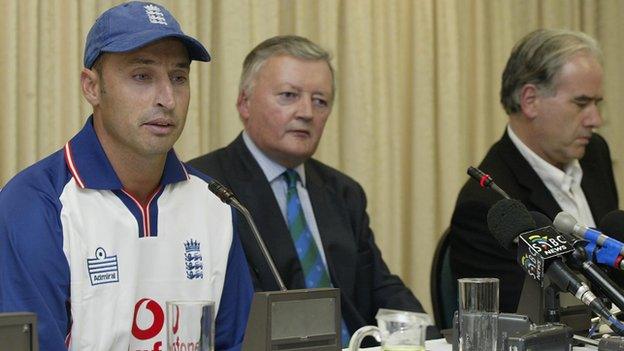
England players held meetings with ICC and ECB officials before deciding to forfeit their match against Zimbabwe
Of all of England's World Cup failures, this one has the least blame attached to the players.
In a tournament held in South Africa, Kenya and Zimbabwe, the British government did not want England to play their game in Zimbabwe for fear of being seen to support President Robert Mugabe.
However, it stopped short of ordering a boycott and the England and Wales Cricket Board, concerned about the financial implications of failing to fulfil the fixture, was reluctant to pull out of the game.
All the while, the International Cricket Council was adamant the match should go ahead unless there was a security reason for it not to.
"The ICC should never have put those two teams together at that venue." said former England fast bowler Andy Caddick. "The ICC wouldn't budge, so the players had to make a stance."
With the game less than a week away, the England team learnt of a threat issued by a group called the Sons and Daughters of Zimbabwe. It said: "Come to Zimbabwe and you will go back to Britain in wooden coffins."
Caddick continued: "We had a number of meetings in the Cullinan Hotel in Cape Town. The British High commissioner was there, the ECB were there and there were representatives from the ICC. At the end of the day, they all left and the players made the decision.
"We as a team said that there was no way we were going.
"We were there to play sport. Politics should never have been involved. But when there are threats against yourself and your family, what is the game worth? Nothing."
England forfeited the match to Zimbabwe. As it turned out, if they had gone to Harare and won, they would have advanced to the Super Six stage.
From there, they may well have had the chance to reach the semi-finals in a tournament where lowly Kenya made it to the last four.
"We had a talented side," Caddick said. "You can kick yourself and say we should have gone to Zimbabwe, but we did what we had to do.
"It goes back to the simple fact that the ICC had the power to sort it out, but they let world cricket down."
2007 - 'I was still wet with sand between my toes'
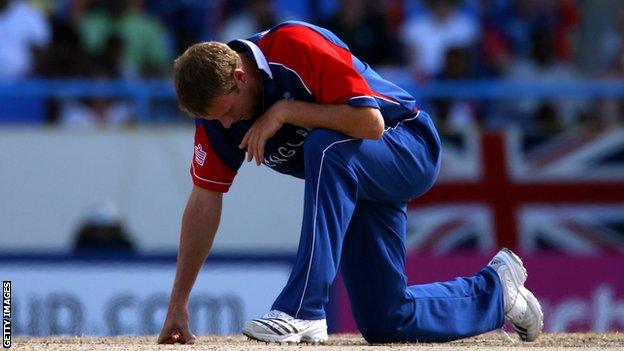
Andrew Flintoff was fined, stripped of the vice-captaincy and banned from England's next game for his late night pedalo incident
Held in the Caribbean, a dire tournament beset by organisational problems and concluding with a final that ended in near darkness was overshadowed by the death of Pakistan coach Bob Woolmer.
From England's point of view, it will always be remembered for the late-night drinking session of Andrew Flintoff that resulted in him taking a pedalo boat into the sea.
Speaking in 2014, Flintoff explained: "About 1.30am I thought: 'I'm hammered here, go home'. I had to walk partially across the beach. For some reason I had an idea about the boats out to sea - I knew Ian Botham was on one and I thought: 'I'm going to have a nightcap with Beefy'. I dragged a pedalo into the water."
When the pedalo capsized, Flintoff had to be pulled from the sea. Next morning, when he woke "still wet and with sand between my toes" he was hauled into a team meeting.
Later, coach Duncan Fletcher put Flintoff in front of the media to apologise. He was stripped of the vice-captaincy, banned from England's next game and was one of six players fined for breaking a curfew.
And all that came after England had played only one match.
They eventually reached the Super Six stage, where a two-run defeat by Sri Lanka ultimately left a place in the semi-finals at stake when they met South Africa.
England were crushed by nine wickets.
"You can look at things like the pedalo incident and think it had a massive effect, but it didn't really," said then-captain Michael Vaughan.
"You can make excuses, but we weren't good enough. We had a Test team that was playing one-day cricket. On the field, not a lot happened for us. It's one to put a black mark next to."
2011 - 'Like Moneyball, without statistical back-up'
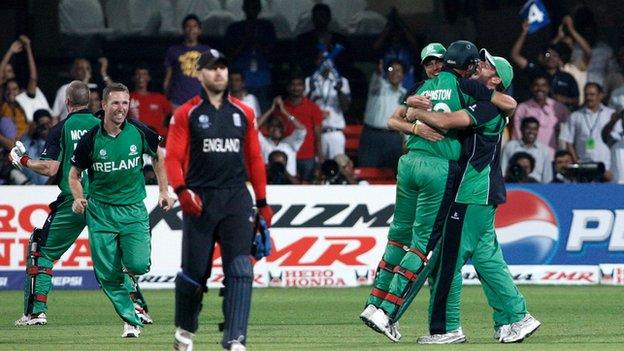
England's most infamous defeat at the 2011 World Cup was against Ireland
On the back of winning the Ashes in Australia, England fell flat in India, Sri Lanka and Bangladesh, but at least managed to throw up some of the tournament's most memorable moments.
Most infamously was the defeat by Ireland, who were inspired to chase 328 by Kevin O'Brien.
"I never thought they'd get them until they were really close to winning," said former England off-spinner Graeme Swann. "When I finished my 10 overs I thought 'there's no chance in the world that we'll lose this game'.
"In the last 10 overs, I was on the physio bed with a tweaked hamstring. I could hear roar, after roar knowing that it wasn't for a wicket, thinking 'he's got to get out some time'.
"When you lose a game like that you feel humiliated, you know you're going to get nailed by the press and that you'll be the butt of jokes, but we didn't do a lot wrong and Kevin O'Brien batted like a deity."
Despite also losing to Bangladesh, England squeezed through to the quarter-finals, where they once again came up against Sri Lanka.
Just like 15 years earlier, they were steamrollered, as the eventual runners-up knocked off 230 with more than 10 overs to spare and all 10 wickets in hand.
"Tillakaratne Dilshan got a hundred and, near the end, was blocking it because he wanted Upul Tharanga to get to 100 too," said Swann. "I was bowling moon balls and he was still blocking them. It was humiliating, really.
"We were still very much tied to stats and believing what a computer said should be a competitive total, rather than just playing the conditions.
"We played to the doctrine of 'if you have this many wickets in hand at a certain point, or if you get this score you'll win this amount of games'. It was like Moneyball without the proper statistical back-up."
Prior to that game, Michael Yardy left the tournament because he was suffering from depression.
"I felt a bit ashamed that I hadn't picked up on it," said Swann. "As a fellow spinner, I thought I should have known a bit more about what was going on. It turned out that no one did apart from Matt Prior.
"There was shock in the room, but at that stage no one really knew how to react to mental health problems. I'm glad it's talked about these days, because we were out of our depth."
2015 - 'Dejection, disappointment and embarrassment'
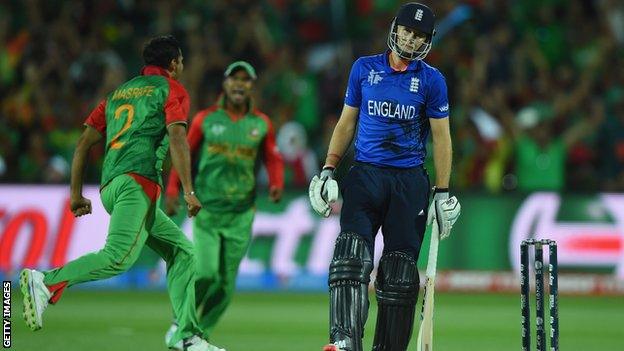
A defeat to Bangladesh sealed England's elimination at the Cricket World Cup 2015
Of all England's World Cup failures, they had never been further behind the rest than in Australia and New Zealand.
The warning signs were there in a chaotic build-up which saw captain Alastair Cook replaced by Eoin Morgan. Even on the eve of their opening game against Australia, England were tinkering with their batting order.
"We didn't know our best XI, we didn't know who was going to open the batting, who was batting three and we didn't know our best bowling attack," said fast bowler James Anderson.
"There would have been players the night before not sure whether they were playing, or guys that hadn't played a lot of cricket in the positions they were going to be in. Two, three or four players being unsure of what they are doing is going to have a detrimental effect on the side."
As the rest of the teams belted the ball to all parts, England plodded along, suffering huge defeats by Australia, New Zealand and Sri Lanka.
"We had a new captain trying to put his stamp on the team at a global event," said Anderson. "He should have been doing that months or even years in advance. We didn't know what sort of team we were.
"We had plans for our batting that were quite structured, but it just didn't work for us. We were careful, often in our own shells. Maybe people were looking after their own games, rather than thinking about the bigger picture."
Their final chance to make the quarter-finals, against Bangladesh in Adelaide, ended in perhaps England's worst ever World Cup result.
"We didn't think 'it's just Bangladesh'," said Anderson. "We were very conscious of not taking them for granted. We bowled OK and kept them to a decent total and were in a good position chasing, but we kept losing wickets and I was last man out. A lack of confidence beat us.
"We were dejected, disappointed and embarrassed. We just weren't good enough."